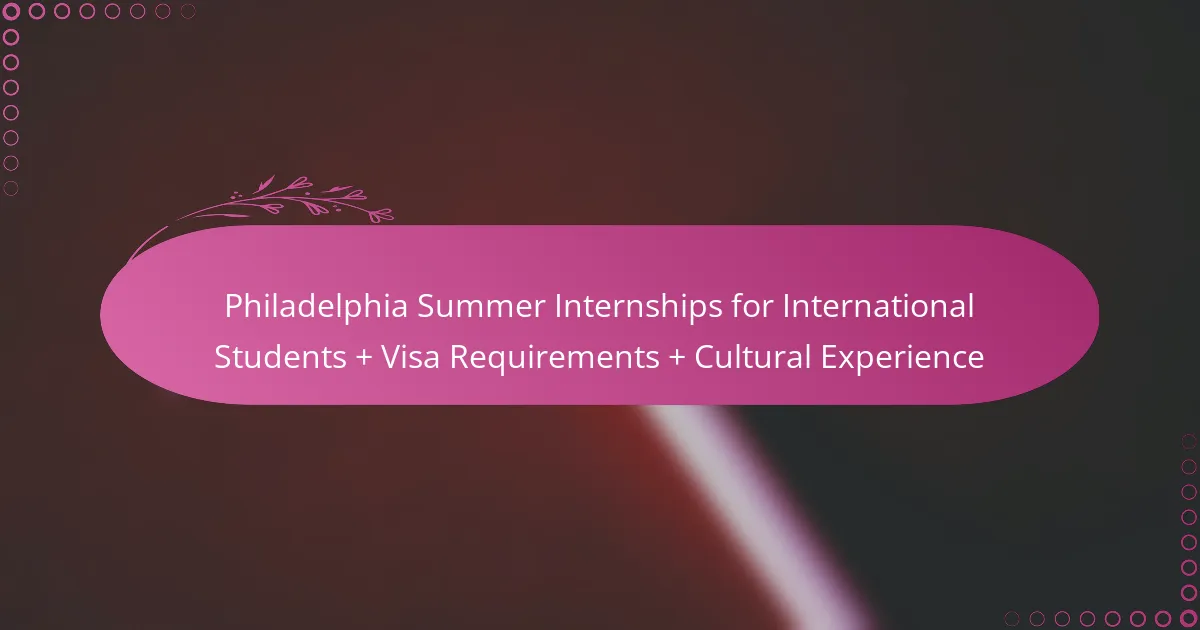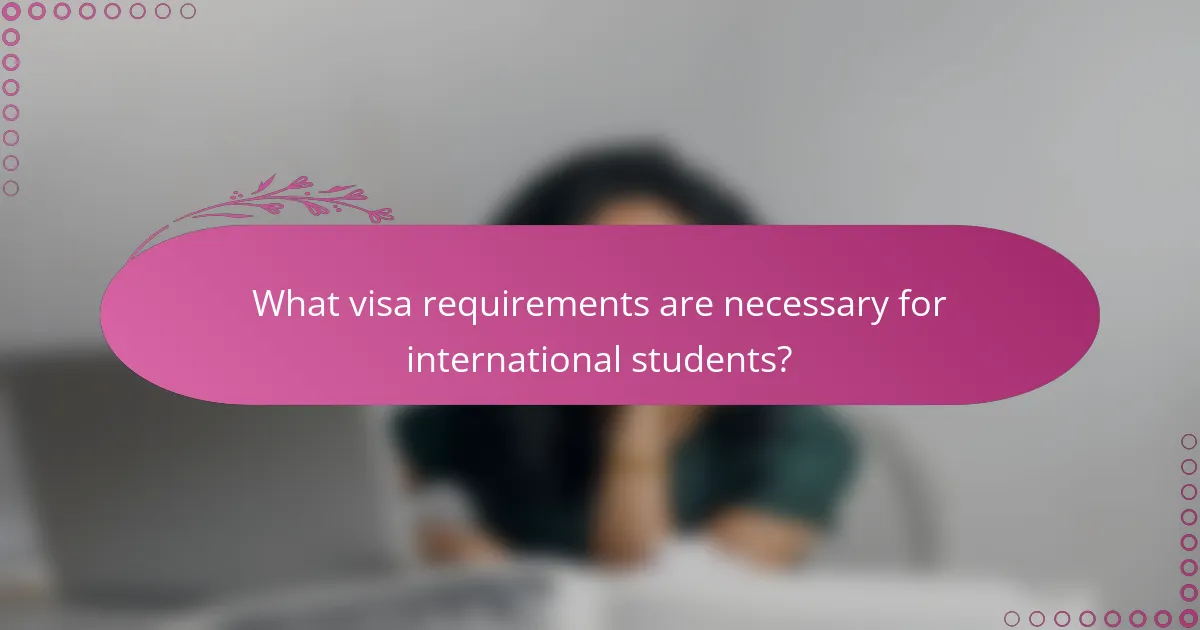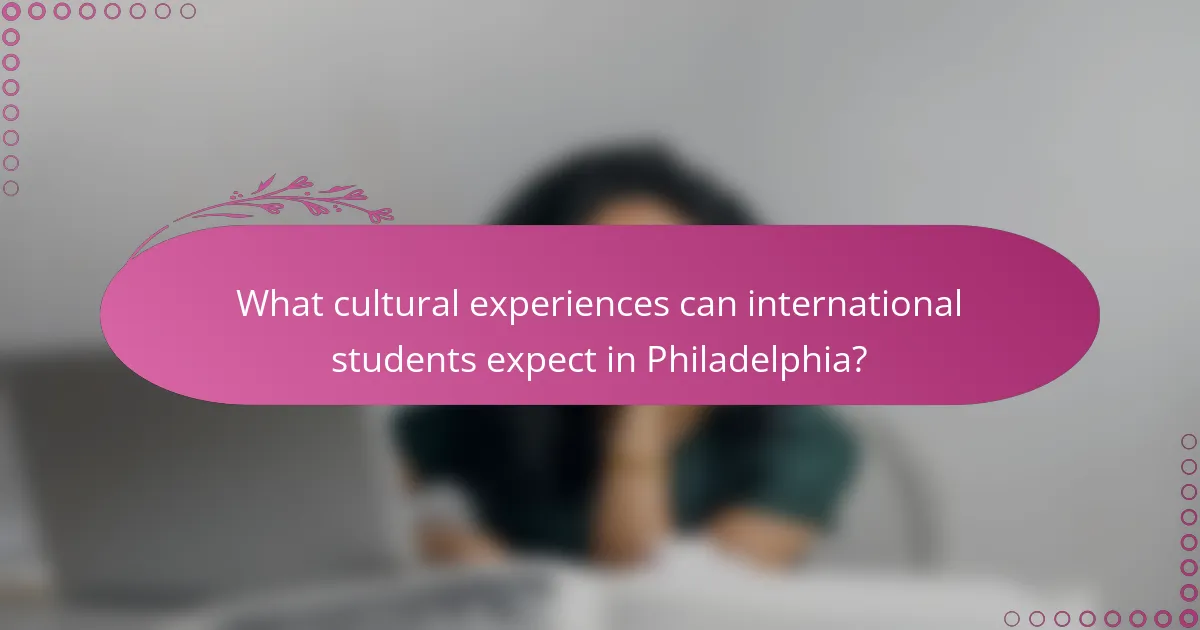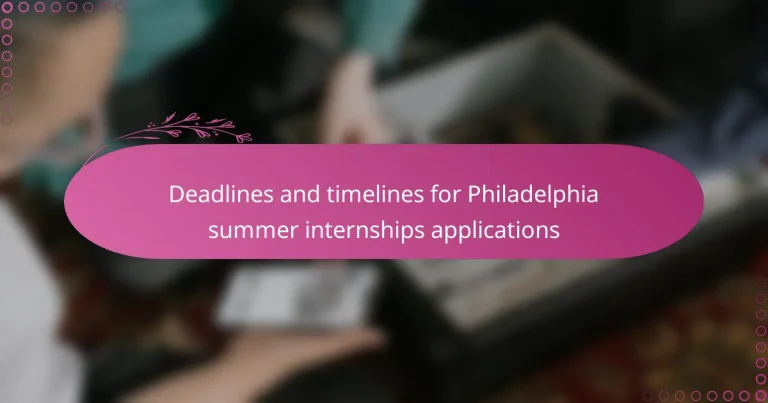

What are Philadelphia Summer Internships for International Students?
Philadelphia Summer Internships for International Students are work opportunities designed for non-U.S. students during the summer months. These internships provide practical experience in various industries while allowing students to immerse themselves in American culture. Interns typically engage in projects relevant to their field of study. Many internships are unpaid, but some offer stipends or hourly wages. International students often require a specific visa, such as the J-1 Exchange Visitor Visa, to participate legally. These internships help students enhance their resumes and build professional networks in the United States. The city of Philadelphia offers a diverse environment, rich history, and numerous cultural experiences that benefit interns.
How do these internships differ from local internships?
International internships differ from local internships primarily in their geographical context and cultural exposure. International internships are typically located in foreign countries, providing unique experiences that local internships do not offer. These internships expose participants to different work environments, business practices, and cultural norms.
In contrast, local internships are conducted within the participant’s home country, often reflecting familiar cultural and professional standards. International internships may require specific visa arrangements, which adds an additional layer of complexity compared to local internships. Furthermore, international internships often emphasize cross-cultural communication skills, which are less emphasized in local settings.
These differences highlight the diverse opportunities and challenges presented by international internships compared to their local counterparts.
What unique opportunities do they provide for international students?
Philadelphia summer internships provide international students with unique opportunities such as professional experience in a diverse work environment. These internships often include mentorship from industry professionals. Students can also enhance their resumes with practical skills that are valuable in the global job market. Networking opportunities with local businesses and professionals are frequently available. Cultural experiences, including workshops and events, help students immerse themselves in American culture. Additionally, internships may lead to potential job offers after graduation. According to a study by the National Association of Colleges and Employers, 60% of interns receive job offers from their internship employers.
How do cultural differences impact the internship experience?
Cultural differences significantly impact the internship experience by influencing communication styles, work ethics, and social interactions. Interns from various cultures may have different expectations regarding authority and teamwork. For example, in some cultures, direct communication is valued, while in others, indirect communication is preferred. This can lead to misunderstandings in a workplace setting. Additionally, cultural norms dictate how individuals perceive time management and deadlines. Interns from cultures with a more relaxed approach to time may struggle in environments that prioritize punctuality. Research shows that cultural adaptability is crucial for success in international internships. A study by K. D. Thomas and M. J. Inkson highlights that cultural intelligence directly affects internship performance and satisfaction. Therefore, awareness of these cultural differences can enhance the overall internship experience for international students.
What types of internships are available in Philadelphia?
Internships in Philadelphia include various types across multiple sectors. Students can find internships in fields such as healthcare, technology, finance, and education. Non-profit organizations also offer internship opportunities. Many companies provide summer internships tailored for college students. Internships may be paid or unpaid, depending on the organization. Some internships focus on research, while others emphasize hands-on experience. Internship programs often include mentorship and networking opportunities. The diversity of internships in Philadelphia caters to a wide range of interests and career goals.
Which industries actively seek international interns?
Technology, hospitality, healthcare, finance, and education industries actively seek international interns. Technology companies need diverse talent for innovation. Hospitality businesses benefit from international perspectives in customer service. Healthcare organizations often look for interns to support global health initiatives. Finance firms seek interns for international markets and economic analysis. Educational institutions value cultural diversity in teaching and research roles. These industries recognize the advantages of international interns in enhancing their global reach and competitiveness.
What skills are most in demand for these internships?
Analytical skills are most in demand for internships in Philadelphia. Employers seek candidates who can analyze data and derive insights. Communication skills are also crucial. Interns must effectively convey ideas and collaborate with teams. Technical skills, particularly in software relevant to the industry, are often required. Proficiency in tools like Microsoft Excel or programming languages can set candidates apart. Adaptability is another valued skill. Interns should be able to adjust to new challenges and environments quickly. Additionally, problem-solving abilities are essential. Employers want interns who can identify issues and propose effective solutions. Finally, cultural awareness is increasingly important for international interns. Understanding diverse perspectives enhances teamwork and workplace dynamics.

What visa requirements are necessary for international students?
International students typically require an F-1 or J-1 visa to study in the United States. The F-1 visa is for academic students enrolled in a full-time program. The J-1 visa is for exchange visitors participating in approved programs. Applicants must be accepted by a Student and Exchange Visitor Program (SEVP) approved institution. They must provide proof of sufficient financial resources to cover tuition and living expenses. Additionally, students need to show a valid passport and complete the Form I-20 or DS-2019. Payment of the SEVIS fee is also required. These requirements ensure compliance with U.S. immigration laws for educational purposes.
What types of visas are available for internships in the U.S.?
The types of visas available for internships in the U.S. include the J-1 visa and the H-3 visa. The J-1 visa is specifically designed for exchange visitors, including interns and trainees. This visa allows individuals to gain practical experience in their field of study. The H-3 visa is for individuals coming to the U.S. for training that is not available in their home country. Both visas have specific requirements and durations. The J-1 visa typically lasts for the duration of the internship, up to 18 months. The H-3 visa can be granted for up to two years. These visas facilitate cultural exchange and professional development for international students.
How can international students apply for these visas?
International students can apply for visas by following specific steps. First, they need to determine the type of visa required for their internship. Common visa types for internships include the J-1 Exchange Visitor Visa and the F-1 Student Visa. Next, students must gather necessary documentation, such as a valid passport, acceptance letter from the internship provider, and proof of financial support.
After collecting documentation, they should complete the visa application form, typically the DS-160 for non-immigrant visas. Following this, students must pay the visa application fee, which varies based on the visa type. They will then schedule a visa interview at the nearest U.S. embassy or consulate.
During the interview, students must present their documentation and answer questions regarding their internship and intentions in the U.S. If approved, the visa will be issued, allowing them to participate in the internship.
What documentation is required for the visa application process?
The documentation required for the visa application process typically includes a valid passport. Applicants must also provide a completed visa application form. A recent passport-sized photograph is usually necessary. Proof of financial support is required to demonstrate the ability to cover expenses. Additionally, an acceptance letter from the internship program is essential. Medical insurance documentation may also be needed. Some applicants must include a police clearance certificate. Lastly, any additional documents requested by the specific embassy or consulate should be submitted.
How do visa requirements vary by country of origin?
Visa requirements differ significantly based on the country of origin. Countries are categorized into groups that determine their visa policies. For example, citizens from the European Union often enjoy visa-free access to the United States. Conversely, individuals from countries like Afghanistan or Syria may face stricter visa requirements. The U.S. State Department provides specific guidelines for each country. These guidelines outline the necessary documentation and application processes. Additionally, bilateral agreements between countries can influence visa policies. Overall, the variation in visa requirements reflects diplomatic relations and security assessments.
What common challenges do students face in obtaining visas?
Students commonly face several challenges in obtaining visas. One major challenge is the complexity of visa application processes. These processes often require extensive documentation, including proof of financial support and acceptance letters from educational institutions. Another challenge is meeting specific eligibility criteria set by immigration authorities. Students must demonstrate language proficiency and sometimes undergo medical examinations. Additionally, visa processing times can be lengthy, causing delays in travel plans. Financial constraints also pose a challenge, as some students struggle to afford application fees and other related costs. Lastly, changes in immigration policies can create uncertainty and confusion for students seeking visas.
How can students overcome these challenges?
Students can overcome challenges related to Philadelphia summer internships by utilizing available resources. They should seek guidance from their university’s career services. Networking with professionals in their field can provide valuable insights and opportunities. Joining local organizations can help them integrate into the community and build connections. Additionally, understanding visa requirements is crucial. Students must familiarize themselves with the specific regulations that apply to their situation. Engaging in cultural exchange programs can enhance their experience. These programs often provide support and resources tailored to international students. By actively seeking assistance and building a network, students can effectively navigate challenges during their internships.

What cultural experiences can international students expect in Philadelphia?
International students can expect a rich array of cultural experiences in Philadelphia. The city is home to diverse neighborhoods, each offering unique cultural events and traditions. Students can explore the historic district, which includes the Liberty Bell and Independence Hall, significant sites in American history. Philadelphia hosts numerous festivals, such as the Philadelphia Folk Festival, celebrating various cultures through music and art.
The city’s culinary scene reflects its cultural diversity, featuring cuisine from around the world. Students can enjoy food markets like Reading Terminal Market, showcasing local and international foods. Additionally, Philadelphia’s museums, including the Philadelphia Museum of Art and the Barnes Foundation, provide insights into both local and global art.
The city also offers opportunities for international students to engage in community events and cultural exchanges. Organizations like the Philadelphia International Institute facilitate connections among students from different backgrounds. Overall, Philadelphia presents a vibrant cultural landscape, enriching the experience of international students.
How does Philadelphia’s culture enhance the internship experience?
Philadelphia’s culture enhances the internship experience by providing a rich historical and diverse environment. The city’s vibrant arts scene fosters creativity and innovation. Interns can engage with numerous museums, galleries, and cultural festivals. This exposure encourages networking opportunities with local professionals. The diverse population promotes inclusivity and varied perspectives in the workplace. Philadelphia’s culinary scene offers unique dining experiences, contributing to social interactions. The city’s historical significance enhances learning about American history and heritage. Overall, Philadelphia’s cultural landscape creates an enriching backdrop for personal and professional growth during internships.
What local customs and traditions should interns be aware of?
Interns in Philadelphia should be aware of several local customs and traditions. Greeting people with a friendly “hello” is common. Tipping service workers 15-20% is expected in restaurants. The city celebrates various festivals, including the Philadelphia Flower Show and the Mummers Parade. Sports culture is significant; attending a Philadelphia Eagles or Phillies game is popular. Additionally, the concept of “brotherly love” is central to the city’s identity. Understanding these customs can enhance the cultural experience for interns.
How can international students engage with the local community?
International students can engage with the local community through various activities. They can participate in community service projects. Volunteering at local organizations fosters connections. Joining cultural exchange programs enhances understanding of local traditions. Attending local events or festivals allows for interaction with residents. Enrolling in community classes helps build relationships and skills. Networking through internships provides professional connections. Many universities also offer programs specifically designed for international students to engage locally. These activities create a sense of belonging and enrich the overall experience in Philadelphia.
What resources are available for cultural integration?
Cultural integration resources include community organizations, language exchange programs, and cultural events. Organizations like the Welcoming Center for New Pennsylvanians offer support for immigrants. Language exchange programs facilitate communication between different cultures. Cultural events, such as festivals and workshops, promote understanding. Universities often provide resources for international students. These resources help individuals adapt to new environments. They foster connections between diverse communities. Accessing these resources enhances the cultural experience in Philadelphia.
What organizations support international students in Philadelphia?
Organizations that support international students in Philadelphia include the International Student and Scholar Services (ISSS) at local universities. ISSS provides resources, workshops, and guidance on visa regulations. Another organization is the Philadelphia International Student Network, which connects students with local events and networking opportunities. Additionally, the World Affairs Council of Philadelphia offers programs that promote cultural exchange and understanding. These organizations are dedicated to helping international students adjust to life in Philadelphia and succeed academically.
How can students find cultural events and networking opportunities?
Students can find cultural events and networking opportunities through various online platforms. Websites like Eventbrite and Meetup list local events tailored to diverse interests. Social media platforms, especially Facebook and Instagram, also feature event pages for cultural gatherings. University bulletin boards and newsletters often announce networking events and cultural activities. Local community centers and cultural organizations provide information on workshops and festivals. Networking can also occur at professional conferences and seminars relevant to students’ fields of study. Engaging with local student organizations can further enhance access to events and connections.
What tips can help international students succeed in their internships?
International students can succeed in their internships by actively engaging with their workplace. Building strong relationships with colleagues is essential. Open communication helps clarify expectations and tasks. Students should seek feedback regularly to improve their performance. Understanding company culture is crucial for effective integration. Time management skills are necessary to balance work and study. Networking can lead to future job opportunities. Utilizing resources like career services can provide additional support. Researching the industry beforehand enhances knowledge and confidence.
How can students make the most of their cultural experiences during their internship?
Students can make the most of their cultural experiences during their internship by actively engaging with the local community. They should participate in cultural events and festivals to immerse themselves in the local culture. Networking with local professionals can provide insights into cultural norms and practices. Attending workshops or classes related to local traditions enhances understanding and appreciation. Volunteering for community service projects allows students to connect with residents and understand societal issues. Exploring diverse neighborhoods helps students experience various cultural perspectives. Keeping a journal of experiences can aid in reflection and learning. Engaging with fellow interns from different backgrounds fosters cross-cultural exchanges.
What best practices should be followed to navigate workplace dynamics?
Effective communication is essential to navigate workplace dynamics. Clear communication fosters understanding among team members. It reduces misunderstandings and enhances collaboration. Active listening is also crucial. Listening attentively shows respect for others’ opinions. Building relationships with colleagues can improve teamwork. Networking within the workplace creates a supportive environment. Adaptability is another key practice. Being flexible helps in managing change and conflict. Understanding workplace culture is vital. Each organization has its own norms and values. Familiarizing oneself with these can ease integration. Lastly, seeking feedback is beneficial. Constructive feedback aids in personal and professional growth.
Philadelphia Summer Internships for International Students are designed to provide non-U.S. students with practical work experience while immersing them in American culture. The article covers various aspects including the types of internships available, the unique opportunities they offer, and the visa requirements necessary for participation. Additionally, it discusses the cultural experiences interns can expect in Philadelphia, the skills in demand, and the resources available for cultural integration and support. Understanding these elements is crucial for international students aiming to enhance their professional networks and adapt successfully to their internship environments.




